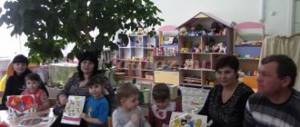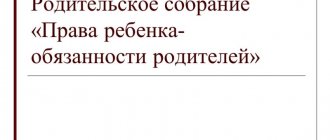Parent meeting. Interaction between family and school material on the topic
Parents' meeting "Family and school: facets of cooperation." (slide 1)
Goal: finding optimal forms of joint work between school and family in the interests of the child.
Tasks:
- To form among parents an understanding of the need for close cooperation between the family and the school.
- To generate among parents an interest in working together with the school in various areas.
- Formation of positive experience of family relationships, attention and love for your children.
Meeting equipment: 4 candles with inscriptions: calm, faith, love, hope; a tree without leaves drawn on whatman paper; green leaves cut out of self-adhesive paper; computer; projector.
Progress of the meeting:
1.Introductory remarks.
— Dear parents, today our parents’ meeting is devoted to the problem of cooperation between family and school. The need and importance of interaction between school and family is obvious. The success of a child’s achievements depends on who and how influences his development. The child spends most of his time at school and at home, so it is important that the interaction between teachers and parents does not contradict each other, but is positively and actively perceived by the child. This is feasible if teachers and parents become allies and like-minded people and solve educational problems with interest and agreement.
As a logo, I chose a picture depicting two hands, as a symbol - schools and families that grow a green sprout, symbolizing our children.
— Once upon a time Lev Kassil said: (slide 2)
“Family and school are the shore and the sea. On the shore, the child takes his first steps, and then an unimaginable sea of knowledge opens up before him. And the school charts a course in this sea...”
2. Parable "Hope".
I bring to your attention a parable about hope in our lives.
Four candles burned calmly and slowly melted... It was so quiet that you could hear them talking.
The first one said:
-I am calm. Unfortunately, people don't know how to save me. I think I have no choice but to go out!
And the light of this candle went out.
The second one said:
-I am faith, unfortunately, no one needs me. People don't want to hear anything about me, so there's no point in me burning anymore.
A light breeze blew and extinguished the candle.
Saddened, the third candle said:
-I am love, I have no more strength to burn. People don't appreciate me or understand me. They hate those who love them most - their loved ones.
And this candle went out...
Suddenly... a child entered the room and saw three extinguished candles. Frightened, he shouted:
- What are you doing?! You must burn - I'm afraid of the dark! - Having said this, he began to cry.
Then the fourth candle said:
-Don't be afraid and don't cry! While I am burning, you can always light the other three candles: I am hope.
This candle in a child’s life is parents and teachers who shine for others while burning themselves out. It is you and I who must ignite in the hearts of children the fire of desire to understand this world, to want to change it, to make ourselves and those around us better.
3. Solving a problem situation.
- Now I offer you a typical problem situation that we will need to figure out. (The situation can, if possible, be staged with trained people)
Mom came to school because the teacher called her.
Mother. Hello, Maria Ivanovna, I received your note. What's happened?
Teacher (to student). Well, tell mom what happened?
The student is silent.
Teacher. Why are you keeping silent? Tell your mom how you behave in class? Why were you kicked out of mathematics? What grade did you get today in Russian?
Student. Yes I do not …
Mother. Well, aren't you ashamed?
Student. Yes, it is not me …
Mother. How long can I talk to you about this topic?
Teacher. And he doesn’t understand any words. All the teachers complain about him.
Mother. Why are you hanging your head? You must be responsible for your actions. Answer me, how long are you going to get on my nerves? Why are you keeping silent? How do you intend to behave further?
Teacher. I came to school, please, study!
Mother (to the teacher). I can’t imagine how else to fight him!
Teacher. Probably, vitamin “P” has not been prescribed for a long time.
Mother. That's it! My patience is over, let your father talk to you now. He'll beat the crap out of you!
- And now I will ask you to answer questions (slide 3)
1. Propose a solution to this situation from the parents’ point of view.
2. To what extent are the interests of the child’s personality taken into account in this situation?
(Parents' arguments)
“In this situation, it is clearly clear that the child is being discriminated against as an individual; he is not even given the opportunity to speak or explain.
— Analyzing this situation, there is a need to create a model of interaction with the family based on cooperation and mutual assistance. Responsibility here is divided in half, and the parties are not customers and performers, but rather members of the same team with different functions and areas of application of forces. In this type of interaction, there is necessarily two-way feedback.
4. Conversation “What kind of person do you want your child to be?”
Makarenko emphasized: (slide 4) “Education is a social process in the broadest sense. It educates everything: people, things, phenomena, but above all and most of all – people. Of these, parents and teachers come first.” (Anton Semyonovich Makarenko)
“But school can neither replace nor fully compensate for what a developing personality receives from parents. In a family, everything is based on emotional connections and attachments. It is the family, and not the school, that acts as an intermediary between society and the child for the purpose of his social protection.
- Tell me, please, what kind of child do you want to see? What character traits should he have? What qualities would you like to give him? (a Whatman paper with a drawn tree without leaves is attached to the board)
-Each of you (and I) has green leaves (the leaves are cut from self-adhesive colored paper). Write on them the qualities that you want to give your child? (Parents write the quality, come up to the tree one by one and, saying the written word out loud, stick a piece of paper to the tree)
- Kind, smart, generous, strong, fair, healthy, caring...
- Look how beautiful the tree turned out. It depends on you and me how a child will grow up (slide 5) - dry, empty, angry and callous, or (slide 6) versatile, happy, kind and everything that is written on these sheets of paper.
- Now I ask you to divide into 4 groups.
- The first 2 groups discuss how these expected results can be achieved with the help of the family, and the other 2 groups - with the help of the school. (Parents discuss and announce proposals)
— Now tell me how you can achieve comprehensive results? (working together)
— It is the joint activities of teachers, parents and children that can be successful when everyone is positively disposed to working together, acts together, carries out joint planning, and sums up the results of activities together.
The family gives the first lessons of love, understanding, trust, faith, and the school does everything possible to educate the child, broaden his horizons, provide an opportunity for his self-realization, for the discovery and manifestation of his abilities.
Innovation in relation to the field of upbringing and education can be considered changes and innovations in the content and technology of training and education in order to increase their effectiveness. (slide 7)
An innovative approach to cooperation between family and school includes:
— development of the child’s personal potential in the context of interaction between school, family, and external society;
-gradual individualization of the educational process through psychological services, an expanded network of clubs, close connections with cultural, art and sports institutions;
— developing communication skills in our students, the ability to understand themselves and others.
5. Objectives of school and family education.
— Interaction between family and school, close cooperation between parents and teachers plays an important role in the learning and development of students. (slide The French historian Lamartine said: “The teacher of the mind is at school, the teacher of the soul is in the family circle,” therefore the most complete, public education is our school-family education.
(slide The French historian Lamartine said: “The teacher of the mind is at school, the teacher of the soul is in the family circle,” therefore the most complete, public education is our school-family education.
Therefore, our joint tasks are: (slide 9)
- make school and family allies in raising children;
- ensure complete mutual understanding and coordinated interaction between school and family in implementing an integrated approach to education;
- ensure the unity of the requirements of the school, class team and family.
6. Presentation of instructions to parents.
— In memory of our parent meeting, I give you the “We Are Together” memo, which contains tips on interaction between family and school in the interests of your child. Read them and try to follow them whenever possible. (slide 10 – 13)
Brief joint comment on some points of the memo. (Application)
7. Decision of the parent meeting.
— Summarizing the above, I propose to include the following in the resolution of the parent meeting: (slide 14)
1. Use optimal forms of joint work between school and family in the interests of the child’s personality. Collaborate more often.
2. Conduct joint events in various areas: holidays, invitations to exhibitions of students’ work, joint design of wall newspapers, etc.
3. Pay more attention and love to your children, as the most precious being on Earth.
- Who has any additions?
- At this point, the parent meeting can be considered closed. (slide 15) Thank you for your attention. Health to you and good luck in raising your children!
Sources and literature used:
- https://ironbp.front.ru/chap2_4.html
- https://www.proshkolu.ru/user/Lucie-lucie/file/145884/
- https://images.yandex.ru
- https://nsportal.ru
- https://festival.1september.ru
- https://s14005.edu35.ru
Parent meeting “Family Relationships”
September 12, 2011
It’s deep autumn outside: it’s gloomy, it’s raining, but here I’d like to create a warm, friendly atmosphere, like in a family. There are autumn leaves in front of you, please write your names on them and attach them. I greet you (list their names).
We are people who have different names, different education, different characters, views on life, different destinies, but there is one thing that unites us - we are all mothers and fathers of our children. Who, if not us, should know that for a child the whole world is his family. Many of us are building our own families.
What is family? (Answers).
This is a word that everyone understands. It is with each of us from the first moments of life. Family is home, parents, close relatives.
You and I are growing up in a family circle,
The basis of the foundations is the parental home.
All your roots are in the family circle,
And you leave your family in life.
When raising a child, we always face problems.
The family team has a complex structure, fixed by customs, traditions, moral and legal norms, within which children, parents, grandparents are united by a whole system of relationships: between older and younger children, between children and parents, etc. These relationships determine the psychological climate of the family.
“What makes up a good family atmosphere?” In a circle, parents offer their options:
- from comfort, order and ready-made lunches;
- from good relations between family members;
- from everyone’s contribution to the common family business;
- from family holidays.
A healthy family is a family without conflicts. Today our topic is devoted to the problems of family relationships, namely conflict situations.
Its goal is to build a model (mental algorithm) of adequate behavior for us, parents.
Everyone will probably agree that there are no conflict-free families. But in some families, conflicts are not only resolved safely, without harming the children, but also help strengthen mutual understanding. In other families, they turn into a protracted “war” in which there can be no winner. Let's try to formulate some causes of conflicts (answers):
- misunderstanding of each other and unwillingness to compromise;
- excessive care of parents for the child, when parents adhere to the following rule: children are created for joy (as a result, a small and then a large despot grows up in the family, accustomed only to receiving and not giving anything in return);
- disagreements between parents on issues of upbringing, when the child has to maneuver between the demands of the father and mother;
- excessive severity towards the child and pedagogical resentment.
I suggest you, dear parents, write your conflict situation...
If you're ready, drop your note in the hat. So is everyone ready?
I ask you to form 2 circles, stand facing each other. Your task is to pull a problem out of a hat, and the person who is opposite you must find solutions. He will then pull the next problem out of the hat. We take a step to the right together (outer circle), the one who stands opposite the one who asked the question will answer.
- What should you do in this situation?
- What advice can really help you resolve a conflict situation?
- What is conflict? (answers)
“A conflict is the fear of at least one side that its interests are being violated, infringed, or ignored by the other side” (W. Lincoln).
- How do you think it is possible to get out of the conflict correctly and resolve it? (answers)
- Have we ever thought that the relationships between adults have an impact on your child? (answers).
I present to your attention a video.
Let's now answer the questions:
- When was the last time you had a private, heart-to-heart talk with your child?
- When was the last time you stroked his head?
- When was the last time you said you love your child?
- When did you look into your child’s eyes with love and tenderness?
If you didn’t do it yesterday or the day before, then do it today.
Parents' reflection:
Game "Scroll"
Continue “A friendly, happy family is...” (I give a piece of paper and start writing first, then the parent answers...)
Let's read our scroll.
The problem of fathers and children has always been relevant at all times, I think that it will never be resolved. In the conflict between the old and the new, movement forward is born, the birth of civilization occurs. And no matter what problems we, parents, face, we must always remember that our children will forever remain our children and only sincere parental love will lead the child out of any difficult situation. And in conclusion, I would like to read Livingston Larned's letter to his son, which is known throughout the world as "A Father's Repentance."
In the most difficult moments of my life, when it seems that there is no way out, there is no understanding with the children, I re-read this letter again and again, and it gives strength for life and love. And I sincerely hope that it will touch a sensitive chord in your hearts.
“Listen, son, I say these words while you sleep; your small hand is tucked under your cheek, and your curly blond hair is stuck together on your damp forehead. I sneaked into your room alone. A few minutes ago, as I was sitting in the library reading the newspaper, a heavy wave of remorse washed over me. I came to your bed with a consciousness of my guilt.
That's what I was thinking, son. I took my bad mood out on you, I scolded you when you were getting dressed to go to school, because you just touched your face with a wet towel. I scolded you for not cleaning your shoes. I yelled at you angrily when you threw some of your clothes on the floor.
I also nagged at you at breakfast; you spilled the tea. You greedily swallowed the food. You put your elbows on the table, you buttered the bread too thickly, and then, when you went to play and I was hurrying to the train, you turned around, waved at me and shouted: “Goodbye, Dad!”, And I frowned and answered : “Straighten your shoulders!”
Then, at the end of the day, it all started again. On my way home, I noticed you on your knees playing with marbles. There were holes in your stockings, I humiliated you in front of your comrades by forcing you to walk home ahead of me. Stockings are expensive - and if you had to buy them with your own money, you would be more careful! Just imagine, son, what your father said!
Do you remember how you then entered the library where I was reading, timidly, with pain in your eyes? When I looked at you over the newspaper, annoyed that I was interrupted, you stopped hesitantly at the door, “What do you want?” I asked.
You didn’t answer, but impulsively rushed towards me, hugged me by the neck and kissed me.
Your hands squeezed me with the love that God put in your heart and which even my neglect could not dry up. And then you left, tramping up the stairs.
So, son, soon after that the newspaper slipped out of my hands, and a terrible, sickening fear took possession of me, what had habit done to me? The habit of finding fault and scolding was my reward for you for being a little boy. It’s impossible to say that I didn’t love you, the whole point is that I expected too much from my youth and measured you by the standard of my own years.
And there is so much healthy, beautiful and sincere in your character. Your little heart is as big as the dawn over the distant hills, this was manifested in your spontaneous outburst when you rushed to me to kiss you before going to bed. Nothing else matters today, son. I came to your crib in the dark and, ashamed, knelt before you!
This is weak atonement.
I know you wouldn't understand these things. If I told you, all this will happen when you wake up. But tomorrow I will be a real father! I will be your friend, suffer when you suffer, and laugh when you laugh. I will bite my tongue when an irritated word is ready to escape from it, I will constantly repeat like a spell: “He is only a boy, a little boy.”
I'm afraid that I mentally saw you as a grown man now that I see you. Son, wearily huddled in your crib, I understand that you are still a child. Just yesterday, you were in your mother’s arms, and your head was lying on her shoulder.
I demanded too much, too much."
Summarizing. Parable
Once upon a time there lived a family. She was not simple. There were more than a hundred people in this family. And she occupied the whole village. This is how the whole family, the whole village lived. You will say: so what, you never know there are many big families in the world, but the fact is that there was a special one - peace and harmony reigned in that family and, therefore, in the village. No quarrels, no swearing, no, God forbid, fights and strife. Rumors about this family reached the very ruler of the country. And he decided to check whether people were telling the truth. He arrived in the village, and his soul rejoiced: all around was purity, beauty, prosperity and peace. Good for children, calm for old people. The lord was surprised. I decided to find out how the villagers achieved such harmony, and came to the head of the family; Tell me, how do you achieve such harmony and peace in your family. He took a sheet of paper and began to write something. I wrote for a long time. Apparently he wasn’t very good at reading and writing.
Then he handed the sheet to the bishop. He took the paper and began to sort out the old man’s scribbles. I took it apart with difficulty and was surprised. Three words were written on paper: LOVE, FORGIVENESS, PATIENCE. And at the end of the sheet: A hundred times LOVE, A hundred times FORGIVENESS, A hundred times PATIENCE. The bishop read it, scratched his ear, as usual, and asked:
- That's all?
- Yes,” answered the old man, “this is the basis of the life of any good family.” - And, after thinking, he added: - And peace too.
And I wish happiness to your families and success in raising children, because children are not only our future, but also our present.
Author of the material: Oksana Alekseevna Mokrousova Teacher of Fine Arts and Drawing, Municipal Educational Institution Secondary School No. 1, Michurinsk
Share with friends
Parents' meeting - Conflicts and ways to resolve themParents' meeting with children - Person and profession
You do not have sufficient rights to add comments
You must be logged in to post comments. If you do not yet have an account on our website, we invite you to register. It will take no more than 5 minutes.



